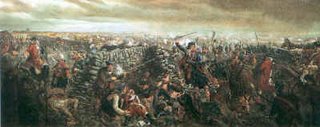
No, this is not a post about the passing of a well loved calibre of firearm. In the year 1746 on this date a pivotal battle was fought on a moor in Eastern Scotland. The place's name still rings in the ears of Scots and those of Scottish lineage: Culloden.
Bonnie Prince Charlie Stuart and his Highland army met one of the strongest armies of the world on the moor enroute, from the east, to Inverness. His goal to reclaim the throne of England from the Hanoverian George II. Why does such a moment in time still move the hearts of men today? For varied reasons. For the Scot it is the bravery of the clansmen: the valiant effort after a long march, a day and one half without sleep and two days without rations. And, it is the memory of the aftermath of Culloden. The English army under general orders massacred every known survivor. The redcoat soldiers relentlessly hunted down any one in anyway connected with the battle and brutally murdered them. The story is too graphic to detail here. Additionally, after the battle for all intents it became illegal to be a Scot. Speaking Gaelic, wearing the tartan, the pipes, and many other activities became illegal. It was an attempt to wipe out a culture. Did it work? Hardly.
So, you may ask, why write about something so long ago? What bearing does it have upon anything today? Good questions. Aside from the Highland blood that flows through my veins there is another reason. We can learn from the rough-hewn Highlanders. They knew that they were headed to battle against a larger, better equipped, professional army. Yet, they still fought. Why? The believed in the cause.
Christian, do you believe in the Cause? Many will say, 'Yes, obviously I believe. I am a Christian.' But, will you battle when the odds are obviously stacked against you? Will you march with your Lord into what, from your vantage point, appears to be sheer insanity?
In this life we must fight. We've already been promised the victory and yet so many cower.



